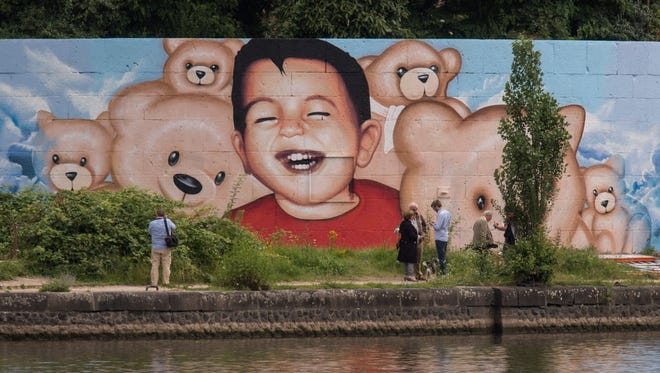One year after photo of drowned Syrian boy, migrant flow blocked

The lifeless body of a 3-year-old Syrian boy, still wearing his socks and sneakers, washed up on a Turkish beach one year ago Friday.
Images of young Alan Kurdi spread around the world and galvanized global calls to address the plight of hundreds of thousands of refugees trying to reach Europe to escape war and persecution in the Middle East and Africa.
Yet in the 12 months since then, Europe has gone to great lengths to repel the tide of refugees and other migrants — rather than welcome them.
European countries responded to a populist backlash against migrants entering the continent by increasing border controls, tightening asylum rules and accelerating deportations.
The well-trod Balkan land route was closed. The European Union and Turkey brokered a deal that significantly reduced the number of people making perilous journeys across the Aegean Sea to Greece and other European ports. That agreement, however, appears to be in jeopardy after a failed but destabilizing coup in Turkey and Ankara's insistence on visa-free travel to the European bloc for its citizens.
Germany, which took in more than 1 million migrants in 2015, is not as welcoming this year because of the rise of anti-immigration sentiment throughout the country. German Chancellor Angela Merkel continues to defend her welcoming refugee policy but has put limits on it.
She said this week in a German television interview that suggestions by some Eastern European countries to refuse Muslim refugees is "unacceptable." She also said the EU needed to find a more coherent strategy and to work with Turkey to make sure its refugee pact succeeds.
Reporter's notebook: Migrants settle in Austria
The barriers have not deterred migrants from making the journey, even as some die attempting to find a better life in Europe. The International Organization for Migration, a watchdog group, said 2,901 people drowned while crossing the Mediterranean Sea in the first six months of 2016 — a 37% increase from the same period last year. Most of those deaths occurred along the dangerous sea route off the Libyan coast, where smuggling is rife.
The Italian coast guard said it has rescued nearly 7,000 migrants, most of them from Eritrea and Somalia, in dozens of rescue missions since Sunday.
EDITOR'S NOTE:
USA TODAY does not typically publish graphic images of dead bodies. It decided to use the photo below because it is integral to this story and illustrates the horror that thousands of migrants face as they seek refuge in Europe. USA TODAY believes the news value of the photo outweighs the usual reluctance to publish such photos.

"We need a comprehensive, multifaceted, long-term policy that puts saving lives and protecting people at the heart of this, and that addresses the problem's root causes," said William Lacy Swing, the International Organization for Migration group's director general and a former U.S. ambassador to Haiti, Nigeria and South Africa. "Until we have that, people will continue to make these dangerous journeys. We now have unprecedented crises and humanitarian emergencies from the western bulge of Africa to well into Asia and Southeast Asia."
As a short-term measure, Swing wants to see greater use of legal visas to admit migrants. "There's a whole range of elements: resettlement, families going to join other members of the family who are already in the U.S. or Europe. There's work visas, student visas. There's also something called 'temporary protective status' such as was given to Haitians during the earthquake," he said.

In economically suffering Greece, which was the main landing point last year for refugees from Afghanistan, Iraq and Syria, the flow of migrants has plummeted under an EU agreement with Turkey to send them back to that country.
Greece's migration minister, Yannis Mouzalas, said the migrant situation is now manageable and not the burden it posed a year ago, as the number of people landing on Greek islands such as Lesbos and Kos each day fell from about 7,000 last October to about 100 in August, a spike from just a few months ago. That was the route young Alan Kurdi was taking when he drowned with his brother and mother.
Reporter's notebook: Walking with migrants
Despite fewer arrivals, Greece still struggles to handle 60,000 migrants stuck in refugee camps before the agreement with Turkey was reached. Those migrants face severe health and security risks, particularly women and children, according to the United Nations.
"We must find a way of dealing with this without just closing borders and stopping people from getting into countries," said Rena Dourou, the governor of Attica, a Greek administrative region that includes Athens. She said a lack of funds is hampering progress.
Abdullah Kurdi, Alan's father and the only family member to survive when the rubber dinghy he was steering capsized, is still mourning, said his sister, Tima Kurdi, who lives in Vancouver, Canada. The father, a Syrian Kurd, has spent the past year in Irbil, a safer refuge in Kurdish northern Iraq, struggling to rebuild his life.
Tima Kurdi told USA TODAY that she would travel to a refugee camp near Irbil to be with her brother Friday for a memorial to mark Alan's death, which happened on Sept. 2, 2015.
"Thank you all for not forgetting what happened to our family and so many other refugees," she wrote in a Facebook post after arriving in Iraq on Tuesday.